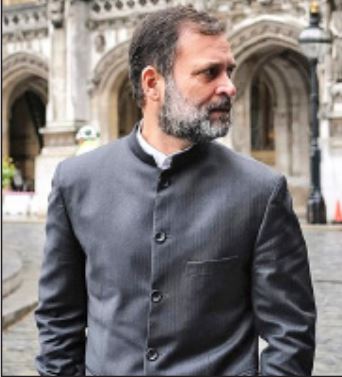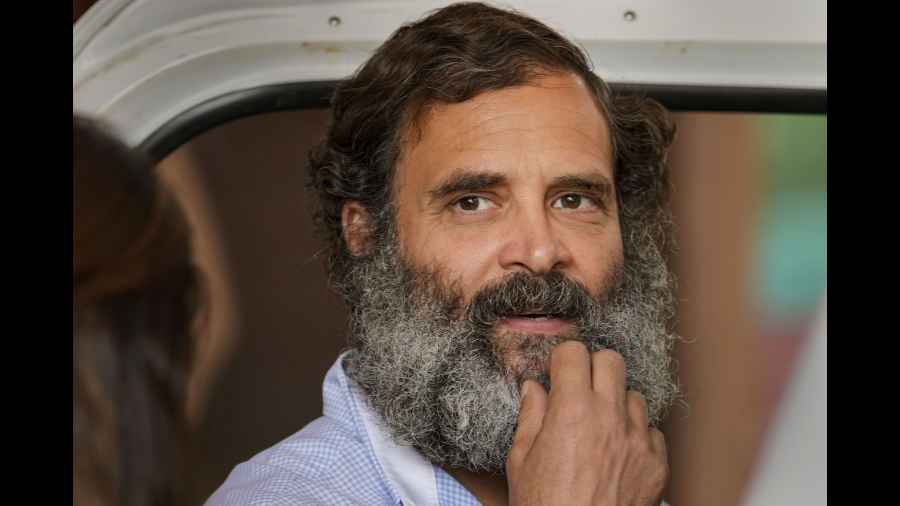Rahul Gandhi is assiduously building a “democracy-in-crisis” narrative ahead of the 2024 parliamentary elections, and has presented the Bharat Jodo Yatra as the best possible response when a dysfunctional institutional framework puts the Opposition at a debilitating disadvantage.
The Congress leader contends that the walk from Kanyakumari to Kashmir was born out of the crisis of democracy — there was no option left but to connect with the people directly because the Opposition’s voice was not allowed to be heard in Parliament or the media, and other key institutions were not operating autonomously. Rahul points to RSS dominance, misuse of agencies by the government, concentration of wealth in the hands of a few, and the centralisation of power within the government and the BJP to explain his charge.
Only mass contact programmes like the Bharat Jodo Yatra could help the Opposition regain lost ground, he said.
Rahul said during his interaction at the Chatham House in London: “I think, the walk that we did in the last four and half months is a powerful model. It brings in a lot of the ingredients of a response to (the BJP’s dominance) and it works for most of the Opposition in India. So, reaching out to the people in interesting ways and making sure that you are having a direct connect with people and building a new imagination, I think, is central to fighting the BJP.”
He continued: “Also, don’t underestimate the resistance. Authoritarian people like to demonstrate how powerful they are and how strong they are… the resistance in India is also very strong, very powerful and can do wonders. But, if we step back from the BJP-Congress conversation, what’s actually happening is a huge transition in India, huge migration of people and India is now searching for a new model with which to engage with its people and the rest of the world and what is pretty clear is… that the BJP model is not it, because it is creating much too much turbulence, much too much resistance.”

Rahul Gandhi at the Chatham House in London on Monday PTI picture
Rahul had talked about the BJP’s divisive politics and targeted Prime Minister Narendra Modi on the Rafale deal with the “Chowkidar-chor-hai” slogan in 2019, too, and had appeared to be making an impact but the discourse got derailed after the Pulwama tragedy. After 40 CRPF jawans were killed in Jammu and Kashmir, the militant attack and the retaliatory air strike on Balakot in Pakistan became the central election issue.
Now, Rahul has expanded the scope of his critique by speaking of institutional capture by the RSS, clampdown on the Opposition in Parliament, the rising unemployment and economic inequality, and has seized on the Adani controversy to rip into Modi’s personal image.
The Congress leader has sharpened the focus on the ideological battle by comparing the RSS with the Muslim Brotherhood and secret societies of the West, and exposed Modi’s boast of robust leadership by highlighting the Chinese intrusion.
Objecting to a question about Beijing antagonising India, he said: “Antagonise is sort of a benign word…. I mean, they are sitting on 2,000 square kilometres of our territory. I don’t know… ‘antagonise’ doesn’t quite capture it. The interesting thing is that when they did it, our Prime Minister said that not a single inch of Indian territory has been taken… now what message does that send to the Chinese? The Chinese know they are sitting on 2,000sqkm of our territory, our military knows it and our Prime Minister says they are not there. So, it encourages them…”
Rahul pointed to the collapse of conversation within the country, and said even the ministers and institutions concerned were not aware of decisions like demonetisation.
But he did not explain how engagement with the people will address the crisis of institutional capture or change the way the media, Election Commission, judiciary, bureaucracy and the central agencies work.
The party has complained about electoral bonds and EVMs without achieving any substantive changes. Former finance minister P. Chidambaram said in a series of tweets: “Over Rs 12,000 crore worth electoral bonds sold so far. The bulk of the amount has been purchased by corporates and donated to the BJP anonymously. Why are corporates so eager to donate through the non-transparent electoral bonds mechanism?”
Chidambaram added: “Corporates do not donate through electoral bonds because they love democracy. Corporate donation is the way to express their thanks to the Government for the numerous favours they had got in the past years. It is a neat arrangement. Favours are done quietly. Rewards are received secretly. Long live our anonymous Democracy.”
Though the Congress has expressed its intention to move the Supreme Court on EVMs, the electoral bond issue is already in the apex court.
It is to be seen whether Rahul’s plan to mount pressure on the government and the media through a massive public outreach will succeed.
The party, however, is working out details of such programmes in the areas that the Bharat Jodo Yatra didn’t pass through.












